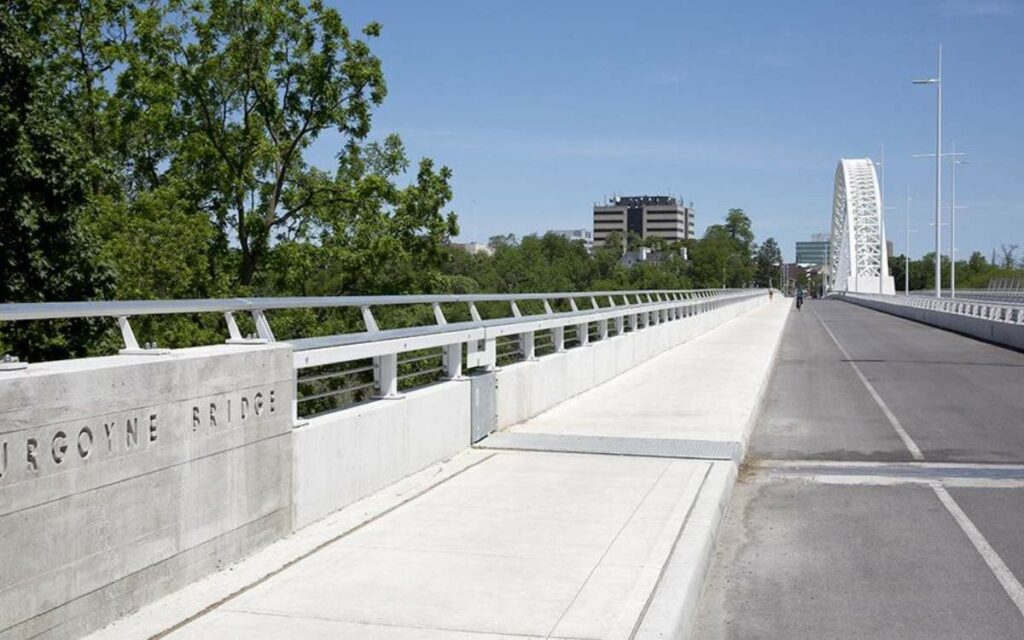
Provincial legislation allows a municipality to appoint an independent Auditor General. The Auditor General is responsible for holding administrators accountable for the quality of stewardship over public funds and for the achievement of value for money in municipal operations. Hamilton has one, Niagara does not. Pictured is the Burgoyne Bridge in St. Catharines – the subject of a major forensic audit in 2017-2018, back when Niagara used the waste-saving tool. Photo credit: CANAM Bridges
When it comes to the internal review of local governments’ finances, not all municipalities are the same – far from it, in fact.
For example, the City of Hamilton has implemented a fully independent Auditor General Office, whereas the Region of Niagara doesn’t even offer an annual audit plan.
And where the City of Hamilton discusses audit issues monthly at their Audit Committee, the Region of Niagara schedules quarterly audit meetings.
So, what’s going on? And what are the consequences of the divergent approaches?
City of Hamilton
Earlier this year, Hamilton’s independent Auditor General Charles Brown reported to City Council on the work of his office.
According to Brown’s latest report, over a 12-month term the City received 107 reports of fraud and waste. Of these reports, 64 per cent were from employees and another 36 per cent were from the public. The Auditor General investigates all reports of fraud and waste. To ensure the independence of Brown’s office, the City of Hamilton’s Fraud and Waste Hotline is operated by an independent third-party firm. All reports to the hotline are confidential and anonymous.
Prior to the establishment of the fraud and waste hotline, the City would receive an average of five reports per year.
Of the reports, 32 per cent were substantiated that fraud or waste occurred. As a comparator, the City of Ottawa has a similar audit hotline, where at last count 25 per cent of their reports were substantiated.
Since the launch of the hotline, cumulatively $1,157,000 of loss or waste has been substantiated. Of this amount. $110,600 was fraud-related, $987,400 was related to waste, and $59,000 in other concerns. Further, as a result of the reports, there have been two employee terminations and four other employment actions taken (such as employee resignations, retirement, and process improvement).
Region of Niagara
In the Region of Niagara, the municipality previously experienced a debacle capital build, where the estimated $60 million Burgoyne Bridge in St. Catharines ended up costing taxpayers $120 million, with multiple lawsuits and devasting damage to the municipality’s reputation.
The initial $60 million was funded by approximately $20 million each from the various levels of government (municipal, provincial, and federal). However, the provincial and federal governments refused to fund the mismanaged cost overruns, burdening the local regional taxpayers with $80 million of the final cost.
A forensic audit of the Burgoyne Bridge project revealed inappropriate hiring practices in Public Works, senior management receiving gifts from contractors, and single-source contracts awarded to select companies.
As a consequence, the 2014-2018 term of Niagara Regional Council introduced an Internal Audit Division to look for fraud and waste in the corporation’s $1.5 billion annual budget. The audit division immediately found questionable financial practices and waste in the usage of credit cards, payroll, and employee expenses.
After the municipal election, the new Council terminated former CAO Carmen D’Angelo, creator of the division, the Director of Audit, and dismissed or re-assigned the division’s certified auditors. After an absence of two years, the Region finally re-hired a single auditor to manage the entire internal audit program.
Last month, Niagara’s Manager of Audit Services presented a status report of the corporation’s ongoing audits but failed to present an annual audit plan. Audit committee members immediately called for a staff report with an annual audit plan and re-scheduled a new meeting to properly discuss the plan.
In terms of a whistleblower policy, the Region of Niagara requires all employees to report their concerns about fraud and waste directly to their respective managers. All complainants are identified to the administration. Since the new whistleblower policy, there was one employee who did dare to complain about waste occurring at Public Works. He no longer works for the municipality, and no other employee complaints have been received since.
In Sum
There is no requirement for a municipality to implement an internal audit program or a whistleblower hotline. The cost to operate these programs with certified auditors can be significant.
However, for single-tier municipalities such as the City of Hamilton, or regional municipalities such as the Region of Niagara, which respectively administer billion-dollar budgets, an internal audit program is essential to stop fraud and waste.




















